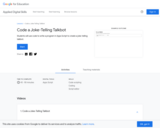
Try out Search Coach and Domains when researching celebrity fashion over time.
- Subject:
- Educational Technology
- Professional Learning
- Material Type:
- Lesson Plan
- Provider:
- Microsoft
- Provider Set:
- Microsoft Education
- Date Added:
- 02/27/2023

Try out Search Coach and Domains when researching celebrity fashion over time.

Try out Search Coach and Domains when researching choosing a pet.

Try out Search Coach and Domains when researching Civil Rights: The Chicano Movement.

This article features children's literature about weather, climate, and climate change. What’s the difference between weather and climate? How do scientists observe, measure, and predict weather phenomena? How is Earth’s climate changing, and why? This month’s bookshelf will help students develop a solid grasp of weather-related concepts. It will also introduce students to global warming and climate change and inspire them to do what they can to combat the problem.

This issue of the free online magazine, Beyond Penguins and Polar Bears, highlights resources that help elementary teachers learn about climate change and teach their students important foundational concepts.

This article assembles free resources from the Climate Change and the Polar Regions issue of the Beyond Penguins and Polar Bears cyberzine into a unit outline based on the 5E learning cycle framework. Outlines are provided for Grades K-2 and Grades 3-5.

Learn how to create a Joke-Telling Talkbot using coding in Google.

This professional development article identifies resources that show young learners (K-grade 5) how scientists study Earth's climate and make predictions. The online lessons either allow students to collect and analyze data or learn about tools and technologies that make data collection possible. The lessons are aligned with national content standards for science education. The article appears in the free, online magazine Beyond Weather and the Water Cycle, which examines the recognized essential principles of climate literacy and the climate sciences for elementary teachers and their students.

This article describes common misconceptions held by elementary students about the history of the polar regions, fossils, and geologic time. The article provides ideas for formative assessment, teaching strategies, and the National Science Education Standards.

This article describes some common misconceptions that elementary students may have about oceans. It also includes suggestions for formative assessment and teaching for conceptual change.

This article describes some common misconceptions that elementary students may have about plants. It also includes suggestions for formative assessment and teaching for conceptual change.

This article discusses geologic misconceptions held by teachers and students and provides resources for formative assessment and teaching correct concepts.

This article lists common misconceptions about states and changes of matter and the water cycle. It provides formative assessment probes and information about teaching for conceptual change.

This article describes common misconceptions about the Arctic and Antarctica and how to test and teach for student understanding.

This article describes some common misconceptions that elementary students may have about biomes and ecosystems. It also includes suggestions for formative assessment and teaching for conceptual change.

This article discusses misconceptions about birds (and penguins in particular). It provides tools for formative assessment and ideas for teaching correct scientific concepts.

This article describes common misconceptions held by elementary students about the cause of day and night and seasons. The article provides ideas for formative assessment, teaching strategies, and the National Science Education Standards.

This article describes some common misconceptions that elementary students may have about energy, heat, and insulation. It also includes suggestions for formative assessment and teaching for conceptual change.

This article describes some common misconceptions that elementary students may have about icebergs and glaciers (including density and buoyancy). It also includes suggestions for formative assessment and teaching for conceptual change.

This article lists common misconceptions about light, heat, and the sun. It provides formative assessment probes and information about teaching for conceptual change.